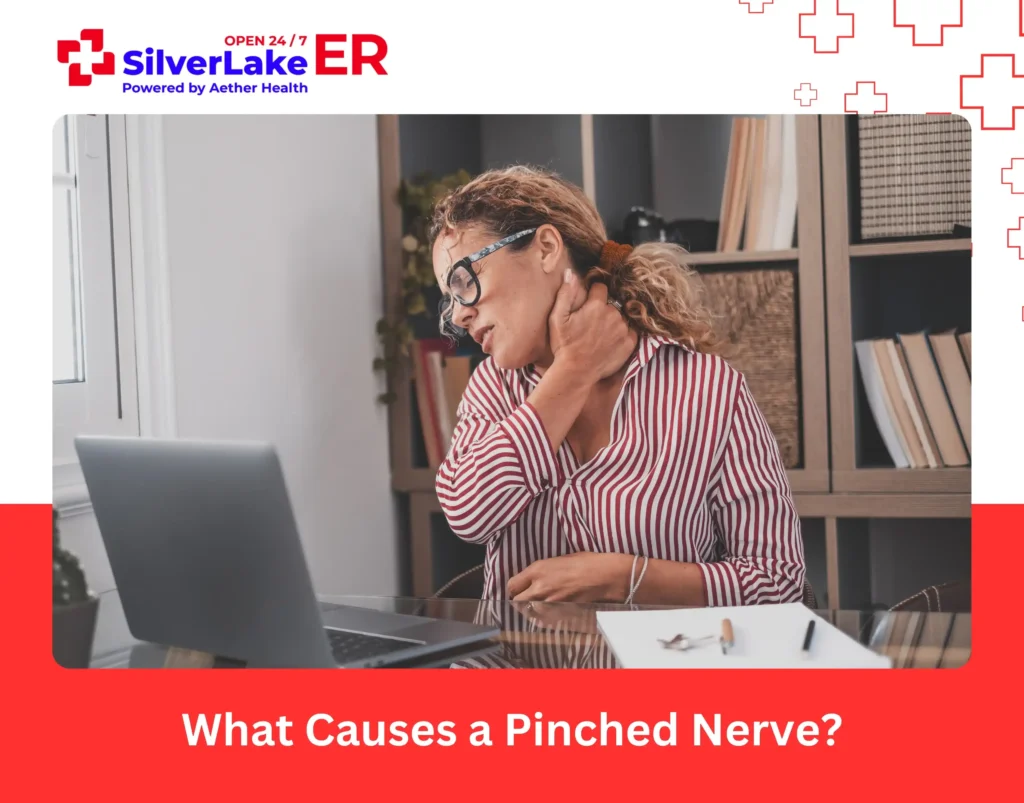Have you ever felt a sharp, shooting pain that seemed to come out of nowhere? Or maybe you’ve noticed tingling or numbness in your arms, hands, legs, or back? These could be signs of a pinched nerve.
But what exactly is a pinched nerve? What does a pinched nerve feel like? And most importantly, when should you see a doctor? Let’s break it down in simple terms.
What Is a Pinched Nerve?

A pinched nerve happens when too much pressure is applied to a nerve by surrounding tissues, such as bones, cartilage, muscles, or tendons. This pressure disrupts the nerve’s function, leading to pain, tingling, numbness, or weakness. It can occur anywhere in the body, but most often affects the neck, lower back, or wrist.
Common causes include:
- Herniated discs
- Bone spurs
- Repetitive motions or overuse
- Injury or poor posture
- Arthritis or obesity
Pinched nerves can be temporary or long lasting, depending on the cause and treatment.
What Does a Pinched Nerve Feel Like?
People experience pinched nerves differently depending on where the nerve is compressed. However, some common symptoms include:
1. Sharp or Burning Pain
You might feel intense pain that shoots down your arm or leg, depending on where the nerve is pinched. The pain may feel like a burning or stabbing sensation.
2. Tingling or “Pins and Needles”
Many people describe a tingling or prickling feeling, similar to when your foot falls asleep. This sensation may come and go or remain constant.
3. Numbness
A pinched nerve often leads to numbness or reduced feeling in the area served by the nerve. For example, a pinched nerve in your neck might cause numbness in your fingers.
4. Muscle Weakness
When nerves that control muscles are compressed, you might notice weakness in the affected limb, making it difficult to lift objects or move normally.
5. Radiating Pain
Pain from a pinched nerve doesn’t always stay in one place. It may radiate outward, such as pain traveling down your arm from your neck, or from your lower back into your leg (known as sciatica).
Common Areas for Pinched Nerves
- Neck (Cervical Spine): May cause pain, numbness, or tingling in the shoulders, arms, or hands.
- Lower Back (Lumbar Spine): Can cause sciatica; sharp pain down the buttock and leg.
- Wrist (Carpal Tunnel Syndrome): Numbness or tingling in fingers, especially the thumb and first three fingers.
- Elbow (Ulnar Nerve): Tingling in the ring and little finger, often called the “funny bone” sensation.
What Causes a Pinched Nerve?

Some of the most common reasons for nerve compression include:
- Poor posture: Slouching or looking down at screens for too long.
- Repetitive movements: Such as typing, lifting, or certain sports.
- Injury: Falls or accidents that cause swelling or disc herniation.
- Arthritis: Inflammation or bone growths (bone spurs) can press on nerves.
- Obesity: Extra body weight puts pressure on nerves.
- Pregnancy: The body’s changes can compress nerves, especially in the lower back.
How Is a Pinched Nerve Diagnosed?
If you think you might have a pinched nerve, see a healthcare provider. They may:
- Review your symptoms and medical history
- Perform a physical exam to test strength, reflexes, and sensation
- Order imaging tests such as: MRI or CT scan (to view soft tissues and nerve compression), Nerve conduction studies (to measure how well your nerves are working)
Treatment Options
Most pinched nerves improve with conservative (non surgical) treatments:
- Rest and Activity Modification: Avoid activities that make the pain worse.
- Physical Therapy: Exercises to strengthen muscles, improve flexibility, and relieve pressure on the nerve.
- Medications: Over the counter pain relievers (e.g., ibuprofen or acetaminophen). Prescription medications for severe pain or inflammation.
- Cold and Heat Therapy: Ice packs reduce inflammation; heat loosens tight muscles.
- Splints or Braces: Helpful for wrist or elbow nerve issues, such as in carpal tunnel syndrome.
- Steroid Injections: May be used to reduce inflammation around the nerve.
- Surgery (If Needed): In severe or persistent cases, surgery may be needed to relieve the nerve pressure.
When to See a Doctor For a Pinched Nerve

You should consult a doctor if:
- Symptoms last more than a few days
- Pain is severe or gets worse
- You experience muscle weakness
- There is loss of bladder or bowel control (seek emergency care)
Frequently Asked Questions (FAQ)
1. How long does a pinched nerve last?
It varies. Mild cases may resolve in days to weeks with rest and treatment. Chronic compression may take longer and sometimes requires surgery.
2. Can a pinched nerve heal on its own?
Yes, many cases improve with conservative care like rest, stretching, and posture correction. However, persistent or worsening symptoms need medical attention.
3. Is a pinched nerve serious?
While not always dangerous, untreated nerve compression can lead to permanent damage or loss of function in severe cases.
4. How can I prevent a pinched nerve?
Maintain good posture, take breaks from repetitive activities, stay active, manage your weight, and stretch regularly.
5. What’s the difference between a pinched nerve and a pulled muscle?
A pulled muscle causes localized muscle pain and stiffness. A pinched nerve often involves radiating pain, numbness, or tingling beyond the injury site.




